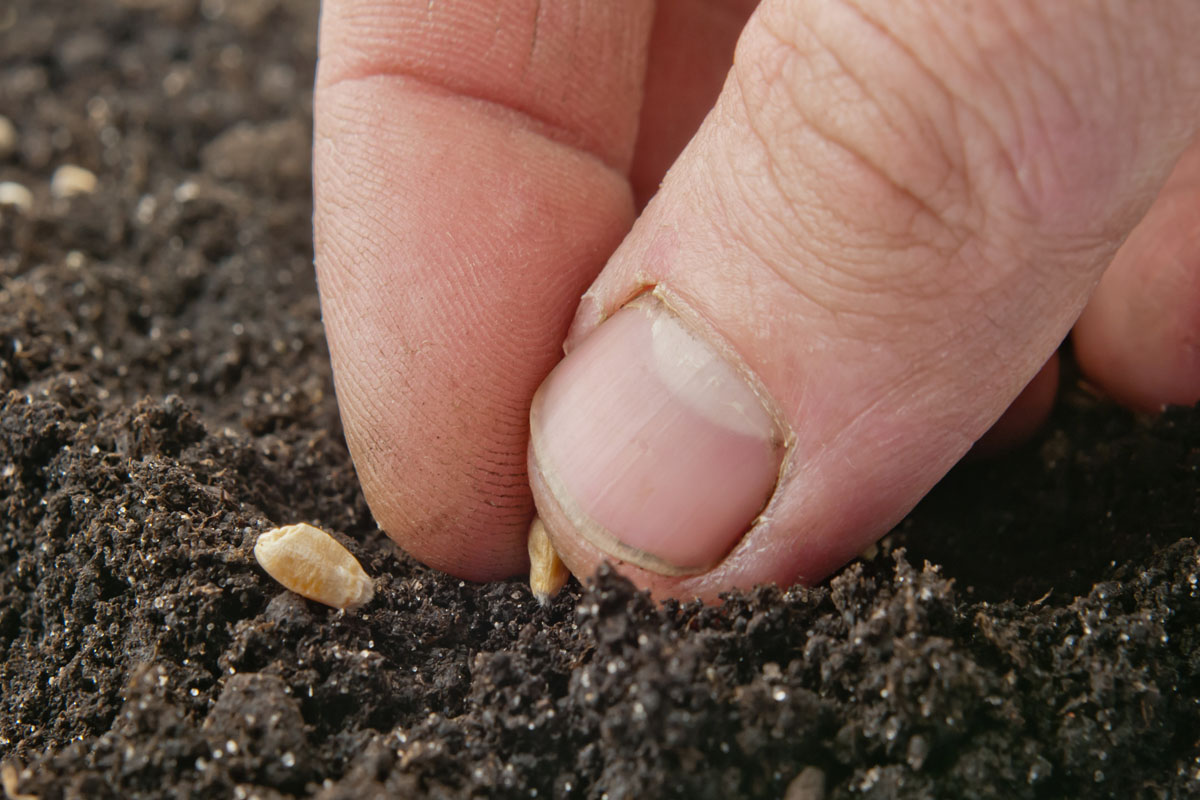John Wesley Taylor V
The parable of the sower and the seed is a call for self-diagnosis: What is the condition of my heart? Can the seeds of God’s Word survive and bear fruit in my life?
Jesus went out of the house where He was staying and sat beside the lake of Galilee. In no time, an eager, expectant crowd gathered around Him, causing Him to get into a boat. He sat down in the boat and taught while the throng stood at the water’s edge. Then He told them many things in parables.1
The parable of the sower and the seed that Jesus told is particularly important.2 It is one of the longest that Jesus told, one of the few recorded in each of the first three Gospels,3 and one for which He provided an explanation. Furthermore, the parable receives premier placement, headlining the rest of the kingdom parables.4 Perhaps most significant is the fact that when the disciples asked about the meaning, Jesus replied, “‘Don’t you understand this parable? How then will you understand any parable?’” (Mark 4:13, NIV).5 This does not mean that this parable is the most easily understood, but rather that it is foundational. It is the gateway parable, the key that unlocks the kingdom.6
THE SOWER AND THE SEED
“Listen carefully,” Jesus said. “A farmer went out to scatter seed in a field.”7
Jesus called it the “‘parable of the sower’” (Matthew 13:18). Is the sower important? Certainly! Harvest depends on sowing.
Who is the sower? Clearly, Christ is the sower. “‘The one who sowed the good seed is the Son of Man’” (Matthew 13:37).8 We, however, are also sowers. “The sower is the Son of God, or the one to whom He delegates His work, for by cooperating with Christ, we are to become laborers together with God.”9 The farmer, then, is Jesus, and, by extension, all who plant kingdom seeds.
What is the seed? We aren’t told what type of grain was being scattered, but what does it represent? “‘The seed,’” Jesus said, “‘is the word of God’” (Luke 8:11). Here are some insights about seeds.
- Seeds are miraculous! A seed is alive. Under the right conditions, a seed can lay dormant for years. But after being combined with soil and water, and exposed to sunlight, it will germinate and grow.10
- Seeds are essential. When God created the world, one of the first things He made was seeds. In fact, human beings were not put on the earth until there were “plants bearing seed” (Genesis 1:12).
- Don’t refine the seed! A kernel of grain contains various parts—bran, endosperm, and germ. Sometimes the germ or the bran is removed to make the grain more palatable, as is done to make white rice. If you remove the germ or the bran, however, the seed will not sprout.
Finally, we come to the soil. What is the soil? Soil represents the hearts of people. Everyone’s heart. Four types of soil mentioned in the parable are four responses to the seed, four conditions of our hearts.
THE FOOTPATH: SEEDS IN JEOPARDY
As the farmer was scattering the seed, some seeds fell on the beaten path. Soon the seed was trampled, and birds swooped down and devoured it.11
The path would typically be along the edge of the field. Sometimes, however, a path would cut right through the field. How was the path created? The hardened path was once soft loam like the rest of the field. Over the course of years, however, it became beaten down by traffic—the passing of feet, hooves, and carts.
What does the path represent? Jesus said that the footpath is “‘anyone [who] hears the message about the kingdom and does not understand it’” (Matthew 13:19). Why don’t they understand? Because they are not paying attention. “The seed sown by the wayside represents the word of God as it falls upon the heart of an inattentive hearer.”12 In other words, they merely listen but don’t take God’s Word seriously.
Luke adds a significant detail. “‘As he was scattering the seed, some fell along the path; [and] it was trampled on’” (8:5). When the soil is soft, a footstep will bury the seed, covering and protecting it. But when the ground is hardened into a path, the seed is trampled. What does “‘trampled’” mean? It simply means that there is too much traffic in our life, that our heart has become a crowded thoroughfare.
Then the birds swooped in. “‘As he was scattering the seed, some fell along the path, and the birds came and ate it up’” (Matthew 13:4). Who are the birds? “‘The evil one comes and snatches away what was sown in their heart’” (Matthew 13:19). Notice that it is not one bird, but many! The devil has countless helpers. It may be a so-called friend who scoffs and ridicules God’s kingdom. “This is irrelevant!” he says, and suddenly the seed is devoured. “That is so ridiculous!” she mocks, and another seed is gone.
Why were the birds able to gobble up the seed? Because the seed remained on the surface. It had not been internalized. There is great danger, in fact, in not integrating God’s Word into our lives. While it lays exposed, birds devour it.
The real problem, of course, is the hardened path. What is the remedy? “‘Plow up the hard ground of your hearts, for now is the time to seek the LORD’” (Hosea 10:12, NLT). Hard soil can be broken up if we seek God with an open heart, with a desire to understand His Word. Then, once the soil has been broken up, set boundaries around your vulnerable spots. Some old associations may need to be severed; some old hangouts, abandoned.
Protect the soil of your heart!
STONY GROUND: SEEDS ON THE ROCKS
Other seeds fell on rocky ground where there wasn’t much topsoil. They germinated and quickly started growing, since the soil was shallow.13
The rocky ground Jesus was referencing was not just topsoil with gravel mixed in. Plants can grow quite well in that type of soil. Rather, Jesus was talking about a section of ground consisting of a thin layer of soil atop a substrate of rock.14 The soil appears to be good, but it is superficial.
Jesus observed that when seed falls on this type of soil, there is spontaneous germination. “’It sprang up quickly,’” He said, “‘because the soil was shallow’” (Mark 4:5). Why does shallow soil cause the seed to quickly sprout? When seed is planted in the spring, the soil is still cool, and it takes time for the seed to germinate. However, when there is rock just below the surface and the sun shines, the rock absorbs the heat. The soil becomes warm, and the seed sprouts quickly.
What does “quick sprouting” mean? “‘When they first hear the Word, they respond with great enthusiasm’” (Mark 4:16, The Message). The problem is not with enthusiasm. Sudden conversions have endured, like Saul of Tarsus, or Matthew, who immediately “left everything and followed [Jesus]” (Luke 5:28). The main concern, though, is not to grow fast but to stand fast.
Perhaps you have seen it happen. People join the church. They love the worship services, the music, the fellowship. They jump full in, singing in the choir, volunteering for Sabbath school, and never missing a service. A few months pass. Adversity strikes. Life hits them in the face. Suddenly these passionate believers are scarce—their seat empty, their role unfulfilled.15 Wonder why? The answer is: no roots.
Mark describes well the problem: They “‘have no root in themselves’” (Mark 4:17, NKJV). Sometimes we depend on our parents for our spiritual life. And we praise God for godly parents. But when we are away from home, or when our parents pass away, we suddenly wither. Our root was in our parents. Sometimes we depend on a God-fearing boss or work associate, or a good friend who loves God. But once we change jobs, or someone buys the business, or our friend moves away, we begin to fade. We did not have root ourselves. Sometimes we depend on the pastor. If our beloved pastor is there to nurture and encourage us, all is well. But when the pastor is called to sow another field, we fall away.16
When the days grew hot, the young plants were scorched. Since they lacked deep roots, they shriveled up and died.17
The cause of the problem is not the sun. Sunshine is necessary for a plant to grow. What proves to be a source of strength to the deeply grounded plant is devastating to the plant with shallow roots.18 Where there is no depth, there is no lasting power. The plants wilt and die. When this occurs with believers, they are full of hope, but they are not faithful. And a faith that cannot be tested, cannot be trusted.
How, then, do believers grow roots? It is not overly complicated.
- Read your Bible and pray. With communication, there is meaningful relationship.
- Take every opportunity for corporate worship. We need to hear God’s Word proclaimed.
- Participate in a small group. We need to experience biblical community.
- Pay attention to what and why you believe. Avoid secondhand spirituality.
- Put into practice what you already know. If we don’t live what we know, why should God teach us something new?
THORNY GROUND: SEEDS IN THE WEEDS
Some seeds fell where thorn bushes grew; and the weeds came up and choked the good plants, so that they did not yield a crop.19
The thorny ground is good soil. If ground can grow prolific weeds, it can surely grow grain. To look at it another way, soil activates seed. The same soil that causes wheat to grow can also trigger thistles to germinate.
What are the weeds? Matthew says that they are the worries of this life and the lure of wealth (13:22, NLT). Luke adds, “life’s worries, riches and pleasures” (8:14), and Mark mentions “the desires for other things” (4:19). So, it seems that there are at least four types of thorny plants:
Worries of life. No one is free from the weeds of worry. The fear of want brings perplexity to the poor. The fear of loss brings anxiety to the rich. In essence, all are preoccupied with the cares of life, overwhelmed with what they must do and all that they want to get.20 This stress strangles the seed and distracts from true kingdom living. What makes you worried?
Lure of wealth. We see what others have, and we focus on what we don’t have. Before long, we’re telling ourselves how wretched our lives are and how vastly improved they would be if we only had _____ (you can fill in the blank). Matthew calls this “the deceitfulness of riches” (13:22, NKJV). That is, riches deceive people. “If I had more money, my problems would be gone.” “Money will make me happy.” “‘Beware!’” Jesus said “‘Guard against every kind of greed. Life is not measured by how much you own’” (Luke 12:15, NLT).21 That empty feeling when the newness wears off or when the toy breaks is a clear indication that nothing but a relationship with Jesus can truly satisfy us.
Pleasures of life. Recreation has its proper place. But it becomes a thorn when the focus of life is on having fun, or when our calling is downgraded into providing resources for pleasure. As Ellen White noted, “Those who learn to love amusement for its own sake open the door to a flood of temptations. . . . Their religious aspirations are chilled; their spiritual life is darkened.”22
Desires for other things. Satan has configured a world packed with sensations and attractions, all to compete for our time and saturate our life. What are these “other things”? Simply, anything that becomes more important to us than God. If we focus our life on anything, however good, short of “the glory of God” (1 Corinthians 10:31), thorns creep in. And thorns are painful. “Some people, eager for money, have wandered from the faith and pierced themselves with many griefs” (1 Timothy 6:10). It all seemed quite innocent at first. The good seed fell into the ground and began to grow. The weeds also sprouted and began to grow. In fact, the weeds seemed to help the young plants by shading them. But then the thorns declared war! You see, there is only a certain amount of nourishment, moisture, and sunlight reaching the ground. If the weeds take it, the wheat must go without.23
The result is that the good plant “‘becomes unfruitful’” (Matthew 13:22, NKJV). Notice, at an early stage, the plant showed promise of fruitfulness. But it never advanced to maturity. Its spiritual life became so overshadowed by a thicket of worldly priorities that it came to nothing.
THE FERTILE GROUND: SEEDS THAT YIELD A HARVEST
But some of the seeds fell into fertile ground and produced a great harvest.24
Certainly, good soil is properly fertilized and balanced with the right amount of nutrients. But Jesus did not say that some soil lacked certain essential elements that would need to be added to make it good. Rather, in the parable, the good soil does not have more. It has less—less hardness, fewer rocks, fewer thorns; less cares, less worries, less distractions.25
What does good soil represent? “The good soil are the ones who hear the Word… and welcome it” (Mark 4:20, Amplified Bible). It is a process:
- Hear God’s Word. “Faith comes from hearing the message, and the message is heard through the word about Christ” (Romans 10:17). We must spend time with God’s Word.
- Welcome the Word. We must believe God’s Word, and wholeheartedly embrace God’s plan for our lives.
- Understand the Word. We must get the Word off the page and into our understanding by memorizing Scripture and reflecting on it.26
- Remain faithful to the Word. “‘The seed on good soil stands for those . . . who hear the word, retain it, and by persevering produce a crop’” (Luke 8:15). Spiritual development takes time. Don’t despair when results are not immediate. Have patience. Be faithful.
Jesus said that the seed that fell in the fertile ground produced a good crop. Some yielded 30 times, some 60 times, and some even 100 times as much as had been sown (Mark 4:8). Ancient two-row barley yields 25 to 30 grains per plant, while early wheat varieties, such as spelt or einkorn, produce a single head with 20 to 30 kernels.27 Consequently, a seed that yielded 30 times would be a bountiful harvest. A yield of 60 times would have been amazing! And a seed that gave 100 times would be a harvest beyond the farmer’s wildest dreams!
What does the harvest represent? It means that the result of hearing, welcoming, understanding, and remaining faithful to God’s Word will be tangible in our lives. The fruit of the Spirit will be evident.28 But there is a second application. When we share God’s Word with others, cross-pollination occurs, and seed begins to be reproduced in others. When that occurs, more seed is produced, seed that the sower can plant.
WRAP-UP
What is the purpose of Jesus’ story? It is not to start categorizing those around us: “He’s rocky soil!” “I know some people just like the hardened path.” “Let’s pray for the folks stuck in the thorny ground.” Sometimes, each of us may have something of the four soils within us. The parable, then, is for self-diagnosis: What is the condition of my heart? Can the seeds of God’s Word survive and bear fruit in my life?
God says, “I will give you a new heart, and I will put a new spirit in you. I will take out your stony, stubborn heart and give you a tender, responsive heart” (Ezekiel 36:26, NLT). What we do with the knowledge of the kingdom comes down to the choices we make each day. The choice is ours!
John Wesley Taylor V (PhD, Andrews University, Michigan, U.S.A.; EdD, University of Virginia, Virginia, U.S.A.) is President of Andrews University in Berrien Springs, Michigan, U.S.A. At the time of writing this article he was an Associate Director of Education at the General Conference of Seventh-day Adventists in Silver Spring, Maryland, U.S.A. He is also a committed gardener, who looks forward to the harvest. E-mail:
Recommended Citation
John Wesley Taylor V, "A sower went out to sow," Dialogue 35:1 (2023): 9-13
NOTES AND REFERENCES
- Author’s paraphrase of Matthew 13:1 to 3, integrating parallel passages from Mark 4 and Luke 8.
- This article is based on Matthew 13:1 to 9, 18 to 23; Mark 4:1 to 20; and Luke 8:4 to 15. Insights from: David Brickner, Christ in the Feast of Tabernacles (Chicago: Moody Publishers, 2006); J. Camarin (2013), Sower of the Seed, JCblog.net. ISBN-13: 978-0615841540; Charles Spurgeon, A Sower Went Out to Sow: Sermons on the Parable of the Sower; compiled by Roger McReynolds (Amazon Digital Services LLC, 2017); Michael D. Stover, Jesus and Dirt: A Fresh Look at the Parable of the Sower (Createspace Independent Publishing Platform, 2017); and Ellen G. White, Christ’s Object Lessons (Washington, D.C.: Review and Herald, 1900), hereafter referenced as COL.
- The Gospel of John does not record any parables.
- Seven parables in which Jesus describes the “kingdom of God” and teaches kingdom principles are recorded in Matthew 13—the sower, weeds, mustard seed, yeast, hidden treasure, pearl, and net.
- Unless otherwise indicated, all Scripture passages in this article are quoted from the New International Version of the Bible. Holy Bible, New International Version®, NIV® Copyright © 1973, 1978, 1984, 2011 by Biblica, Inc.® Used by permission. All rights reserved worldwide. Texts credited to NLT are quoted from the New Living Translation of the Bible. Holy Bible, New Living Translation, coyright © 1996, 2004, 2015 by Tyndale House Foundation. Used by permission of Tyndale House Publishers, Inc., Carol Stream, Illinois 60188. All rights reserved. Texts credited to The Message are quoted from The Message. Copyright © 1993, 2002, 2018 by Eugene H. Peterson. Texts credited to NKJV are quoted from the New King James Version of the Bible. Scripture taken from the New King James Version®. Copyright © 1982 by Thomas Nelson. Used by permission. All rights reserved. Texts credited to Amplified are quoted from Amplified Bible (Classic). Copyright © 1954, 1958, 1962, 1964, 1965, 1987 by The Lockman Foundation, La Habra, CA 90631. All rights reserved.
- As Ellen White noted, “The great controversy between Christ, the prince of light, and Satan, the prince of darkness, is presented before us in the parable of the sower” (From the Heart (Hagerstown, Md.: Review and Herald 2010), 107). Hereafter referenced as FH.
- Author’s paraphrase of Matthew 13:3, integrating parallel passages from Mark and Luke.
- "Christ had come, not as a king, but as a sower; not for the overthrow of kingdoms, but for the scattering of seed; not to point His followers to earthly triumphs and national greatness, but to a harvest to be gathered after patient toil” (COL 35).
- FH 107.
- “Every seed has in itself a germinating principle. In it the life of the plant is enfolded. So there is life in God’s word. . . . He who by faith receives the word is receiving the very life and character of God” (COL 38).
- Author’s paraphrase of Matthew 13:4, integrating parallel passages from Mark and Luke.
- COL 44.
- Author’s paraphrase of Matthew 13:5, integrating parallel passages from Mark and Luke.
- “Many who make a profession of religion are stony-ground hearers. Like the rock underlying the layer of earth, the selfishness of the natural heart underlies the soil of their good desires and aspirations. . . . This class may be easily convinced, and appear to be bright converts, but they have only a superficial religion” (COL 46).
- Adapted from Stover, Jesus and Dirt: A Fresh Look at the Parable of the Sower, 10.
- Adapted from Spurgeon, A Sower Went Out to Sow: Sermons on the Parable of the Sower, 90, 91.
- Author’s paraphrase of Matthew 13:6, integrating parallel passages from Mark and Luke.
- Adapted from Stover, Jesus and Dirt: A Fresh Look at the Parable of the Sower, 12.
- Author’s paraphrase of Matthew 13:7, integrating parallel passages from Mark and Luke.
- Matthew 6:25–34.
- See also Proverbs 23:4, 5 and Matthew 6:24.
- COL 54.
- Adapted from Spurgeon, A Sower Went Out to Sow: Sermons on the Parable of the Sower,107.
- Author’s paraphrase of Matthew 13:8, integrating parallel passages from Mark and Luke.
- Adapted from Camarin, Sower of the Seed, 42.
- “The seed falling on good soil refers to someone who hears the word and understands it” (Matthew 13:23). “Merely to hear or to read the word is not enough. He who desires to be profited by the Scriptures must meditate upon the truth that has been presented to him. By earnest attention and prayerful thought, he must learn the meaning of the words of truth” (COL 59).
- https://www.yara.co.uk/crop-nutrit ion/barley/barley-categorisation/; https://weizen.uni-hohenheim.de/en/organization/ publication/comparative-study-of-hulled-einkorn-emmer-and-spelt-and-naked-wheats-durum-and-bread-wheat-agronomic-performance-and-quality-traits.
- Galatians 5:22.
https://dialogue.adventist.org/3777/a-sower-went-out-to-sow





































